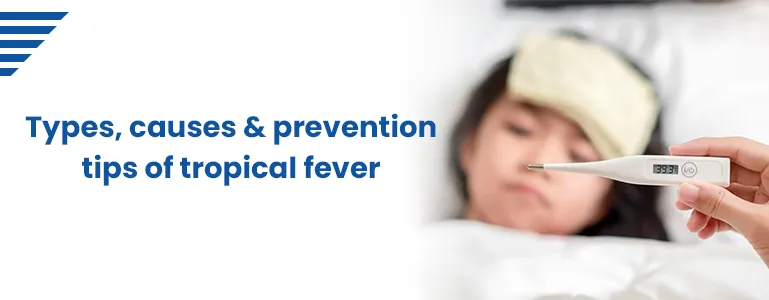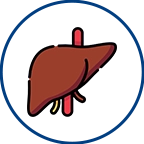Unraveling Tropical Fever: Types, Causes, and Vital Prevention Tips

Tropical fever, a broad term encompassing various infectious diseases prevalent in tropical and subtropical regions, poses a significant health challenge for millions of people worldwide. These fevers are caused by a range of pathogens, including viruses, bacteria, and parasites, and can lead to severe health complications if not promptly managed. In this blog, we'll explore the different types of tropical fever, delve into their causes, and discuss crucial prevention tips to stay safe in regions where these diseases are endemic.
Home Sample Collection
Types of Tropical Fever
Tropical fevers encompass a diverse array of illnesses, with some of the most common types including:
Malaria : Transmitted through infected mosquitoes, malaria is caused by the Plasmodium parasite. Symptoms include fever, chills, headache, and muscle aches.
Dengue Fever : A viral infection transmitted by Aedes mosquitoes, dengue fever manifests as high fever, severe headache, joint and muscle pain, and skin rash.
Chikungunya : Also transmitted by Aedes mosquitoes, this viral infection leads to fever, joint pain, and rash.
Typhoid Fever : Typhoid fever, which is brought on by the Salmonella Typhi bacterium and is spread by tainted food and water, is characterized by a high fever, stomach pain, and weakness.
Yellow Fever : Transmitted through infected mosquitoes, yellow fever causes fever, jaundice, and in severe cases, organ failure.
Zika Virus : Another Aedes mosquito-borne illness, Zika virus infection can lead to mild fever, rash, and birth defects in pregnant women.
Causes of Tropical Fever
Tropical fevers have distinct causative agents:
Vector-Borne Transmission : Mosquitoes are primary carriers for diseases like malaria, dengue, chikungunya, and Zika. These insects thrive in warm and humid environments, making tropical regions their ideal breeding grounds.
Contaminated Food and Water : Bacterial infections such as typhoid fever are often contracted through the consumption of contaminated food and water.
Viral Infections : Viruses like yellow fever and Zika can spread through mosquito bites or sexual contact.
Poor Sanitation and Hygiene : Tropical diseases spread because of inadequate sanitation systems and bad hygiene habits.
Prevention Tips
Protecting oneself from tropical fever involves a multi-faceted approach:
Use Mosquito Repellents : Apply effective mosquito repellents on exposed skin to reduce the risk of mosquito bites.
Wear Protective Clothing : Cover your skin with long sleeves, pants, and socks, especially during peak mosquito activity times.
Eliminate Breeding Sites : Reduce mosquito populations by emptying standing water containers and keeping your surroundings clean.
Immunizations : Seek appropriate vaccinations before traveling to tropical regions. Vaccines are available for diseases like yellow fever and typhoid.
Safe Food and Water : Consume only well-cooked food and drink bottled or purified water to prevent bacterial infections.
Personal Hygiene : To prevent the spread of disease, wash your hands frequently with soap and fresh water and practice good personal hygiene.
Avoid Travel During Outbreaks : Stay informed about disease outbreaks and consider postponing travel plans to affected areas.
Conclusion
Tropical fevers present a significant health challenge for those living in or traveling to tropical regions. Understanding the types, causes, and prevention strategies is crucial for staying safe. Individuals can significantly lower their risk of developing these crippling diseases by taking preventative measures, which also helps to improve the general state of public health in these areas. The best prevention against tropical fevers is education and being proactive.
Frequently Asked Questions
What exactly is tropical fever?
A set of infectious disorders that are common in tropical and subtropical areas are referred to as tropical fever. These illnesses frequently present with symptoms like fever, body pains, and other flu-like symptoms and are typically brought on by pathogens including viruses, bacteria, and parasites.
What are the common types of tropical fever?
Some common types of tropical fever include:
Malaria : Caused by Plasmodium parasites and transmitted by mosquitoes.
Dengue Fever : A viral infection transmitted by Aedes mosquitoes.
Chikungunya : Another viral infection spread by Aedes mosquitoes.
Typhoid Fever : Bacterial infection caused by Salmonella Typhi through contaminated food and water.
Yellow Fever : Caused by a virus transmitted by infected mosquitoes.
Zika Virus : A viral infection primarily transmitted by Aedes mosquitoes.
How are these diseases transmitted?
These diseases are often transmitted through different mechanisms, including mosquito bites (mosquito-borne diseases), contaminated food and water, and in some cases, sexual contact.
What are the main symptoms of tropical fever?
Symptoms vary depending on the specific disease but can include fever, body aches, joint pain, headache, rash, stomach issues, and fatigue.
What is the role of mosquitoes in tropical fever?
Mosquitoes are common vectors (carriers) of many tropical diseases. They spread diseases by biting an infected person and then transmitting the pathogen to another person through their bites.
How can I protect myself from tropical fevers?
Use mosquito repellents on exposed skin.
Wear protective clothing, such as long sleeves and pants.
Remove standing water to eliminate mosquito breeding sites.
Get vaccinated before traveling to endemic areas.
Consume safe, well-cooked food and drink purified water.
Maintain good personal hygiene and wash hands frequently.
Can I travel to tropical regions without contracting these diseases?
While the risk can never be fully eliminated, practicing preventive measures significantly reduces your chances of contracting tropical diseases. It's essential to research and be aware of disease outbreaks in your destination and take appropriate precautions.
Are there vaccines available for these diseases?
Yes, vaccines are available for some tropical diseases like yellow fever and typhoid. It's recommended to consult a healthcare professional well before your travel date to ensure you receive the necessary vaccinations.
What should I do if I experience symptoms after traveling to a tropical region?
If you experience symptoms such as fever, headache, muscle pain, or other flu-like symptoms after traveling to a tropical region, seek medical attention promptly. Inform your healthcare provider about your travel history, as it can help with accurate diagnosis and treatment.
Are these diseases treatable?
Yes, many tropical diseases are treatable if detected early. Malaria, for example, can be treated with antimalarial drugs, while bacterial infections like typhoid fever can be treated with antibiotics. However, prevention remains the best strategy.
Book Appointment
Our Locations Near You in Hyderabad
3KM from Banjara Hills
1.9KM from Yusufguda
3KM from Madhura Nagar
5KM from Shaikpet




